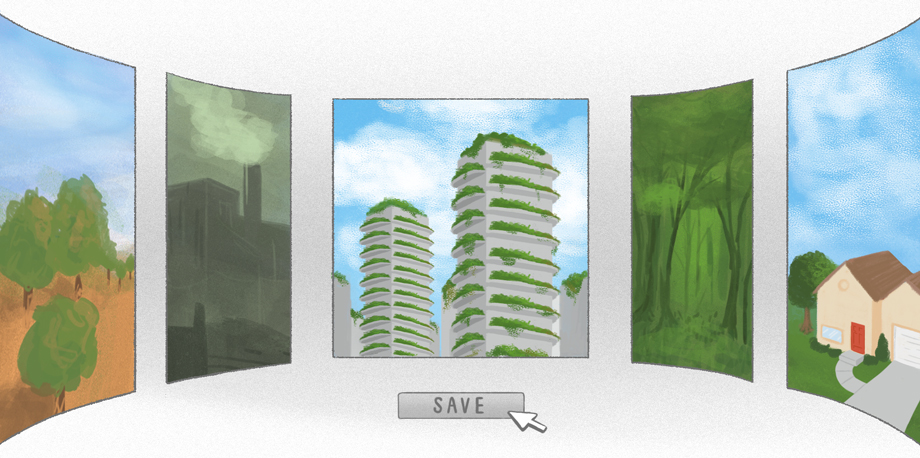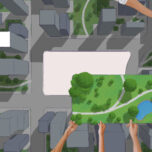January 24, 2019 — As I look back on 2018, the thing I’ll remember most is being with my mother for her final days.
At 86, she was doing great until she had a stroke around Halloween. That began a cascade of events that put her in and out of the intensive care unit. She staged a remarkable rebound that allowed her to leave the ICU and have one last wonderful 24 hours talking with me, my siblings and my father. She died just before Thanksgiving.
It was a bittersweet experience that, paradoxically, shed light on something that’s been nagging me about my profession for some time.
As environmentalists, we often refer to our work as “saving the planet.” This is unhelpful for a couple of reasons.
The World Is Not Binary
First, framing the challenge of living on a changing planet as a rescue mission is confrontational, which puts environmentalists in the role of “hero,” fighting those out to “harm” the planet.
Of course, there are a lot of bad actors out there who willingly destroy our natural systems in the pursuit of profit. But we all impact the environment in some way. In my role as an executive at Environmental Defense Fund, where I mostly work on agricultural and coastal resilience issues, I encounter good, honorable men and women who are responding to a set of powerful economic incentives and social norms that influence their actions.
If you think your job is to save the planet, it’s easy to slip into a binary world. It’s you against those people. A species exists or it’s extinct. A wetland is a wetland or it’s a parking lot. My mom is either alive or dead.
Even if humans never emerged as a major planetary change agent, Earth would still change. And yet the pull is there. We want places (and people) that are special to us to never change.
In those last weeks with my mom, we, as a family, were not making a binary decision. We cannot prevent death. What we faced were choices among equally compelling values — in our case, quality of life and duration of life. Science, in the form of doctors, could give us probabilities associated with different choices we could make. But, if you’ve lived through such a situation, you know the science can never make the choice for you. It was up to us to decide the course of action.
Freezing a Moment in Time
The second reason we should stop saying “save the planet” is that it creates the expectation that we can freeze a moment in time.
We can no more stop an ecosystem from evolving than we can stay forever young. Our own lives are so short that it is easy to think of an ecosystem as permanent. But geology tells us that Earth has lived through wildly different eras. The notion of saving an ecosystem “in perpetuity” — which is currently enshrined in many conservation laws and policies, including in easements — is as ungrounded in science as would be a quest to make my mom immortal.
Even if humans never emerged as a major planetary change agent, Earth would still change. And yet the pull is there. We want places (and people) that are special to us to never change. We may have the ability to make sure that change is far enough in the future that we ourselves won’t see it. But that is different from preventing change to a place or the extinction of a species.
Working Through Trade-Offs
In the process of deciding what kind of future we could have with my mom, my family processed a lot of science, some competing values, and hopes and fears. I came away feeling like I’d deepened relationships and opened doors to new friendships that metaphorically helped my mom live forever.
What would happen if we brought that same frame of mind to thinking about the environment?
Science is important, but it is not a weapon to be wielded — because science can never settle questions of trade-offs among values.
For starters, things would be less confrontational, less “us against them.” And it would open us up to the realization that while timelines are considerably longer than one human life, we cannot prevent the fact that ecosystems will change. That doesn’t mean anything goes. We need to talk with each other about what we want the world to look like and how we can influence the trajectory to make it more likely that our great-grandkids will be living in that world.
We would also use science differently. Science is important, but it is not a weapon to be wielded — because science can never settle questions of trade-offs among values.
Working through trade-offs is exactly what we need today. It’s difficult and time consuming, but it can yield uplifting and durable results.
Case in point. My colleague, Steve Cochran, did this with partners in New Orleans by putting together an international design competition called Changing Course, which brought together experts and citizens to create a shared vision for the Mississippi River Delta.
Louisiana is losing land rapidly — mostly because the Mississippi River has been dredged, dammed and re-engineered over the past century to make way for shipping and oil and gas exploration. Rising seas are now accelerating the problem.
When “saving the planet” creates heroes and villains, we lose the ability to collaborate on durable solutions.
Not all of Louisiana can be “saved.” Some of it will inevitably sink into the Gulf of Mexico, and managed retreat will be necessary in some places. But other places can be fortified with natural solutions, such as restoring barrier islands and strategically diverting sediment from the Mississippi to help build land. By considering the science, trade-offs and involving affected communities, Changing Course managed to produce a set of foundational ideas around the idea that a smaller, sustainable Delta could survive and support the population and culture of south Louisiana. Elements of the competition’s recommendations are now being woven into the state’s Coastal Master Plan, particularly a strong focus on reconnecting the river to its delta, even while trade-off discussions continue.
Growth and Change
In her own way, my mom nurtured an ecosystem that is thriving beyond her.
Environmentalists can do the same. The choices we make about the stewardship of nature have a profound impact on quality of life — whether that is measured in a single life or in the vast time spans of planetary response to human and natural forces.
When “saving the planet” creates heroes and villains, we lose the ability to collaborate on durable solutions. And when “saving the planet” means trying to keep ecosystems from changing, that is the equivalent of trying to keep our kids from growing up.
In fact, it’s often the recognition that growth and change are essential parts of who we are that forms the foundation of rewarding relationships with each other and with the world around us. ![]()
Editor’s note: The views expressed here are those of the author and not necessarily of Ensia. We present them to further discussion around important topics. We encourage you to respond with a comment below, following our commenting guidelines, which can be found on this page. In addition, you might consider submitting a Voices piece of your own. See Ensia’s Contact page for submission guidelines.
Related Posts
Ensia shares solutions-focused stories free of charge through our online magazine and partner media. That means audiences around the world have ready access to stories that can — and do — help them shape a better future. If you value our work, please show your support today.
Yes, I'll support Ensia!





I read your article,"WHAT MY MOTHER’S DEATH TAUGHT ME ABOUT SAVING THE PLANET. WE CAN’T, AND HERE’S WHY", and was very impressed. This has to be the most sober, articulate, honest environmental ly-related article that I have ever read on the topic of what we as humans can honestly do about the world we live in. You are absolutely right. We and the planet we live on are finite. As we both grow older we change. The truth is, as you mentioned, we can't stop that process. All we can do is attempt to make things better at the present and for those who follow after us.
Many people do have a choice as to how they will live. Many do not. We live in a country that allows us some latitude to pursue activities that help to improve our lives. There are other countries, and there are more of these than ours, that are not either interested in improving the environment in which they find themselves or they don't have the resources even though they would like to improve their environment.
What you are doing (your involvement in the Environmental Defense Fund) and what I am doing (Adjunct Professor teaching Environmental Science) will have some impact on the next generation. Hopefully, they will have learned something about the planet that they live on and what some of the challenges are that they must attempt to improve upon. We can't force them to be good stewards of the world around them. We can only hope that they have heard and seen things from us that will cause them to have a desire to become good stewards of nature.
Thanks again for sharing your thoughts.
Dr. John M. Krolak
jkrolak53@outlook.com
Best wishes!
NO ONE wants dirty air, water or contaminated landscapes. Yet, often times problems of this nature are presented in the simple light of a binary choice. Since I am NOT for someone’s
means or method of doing something, that is prima facia evidence of my wanting things to be filthy.
Your comments have gone a long way towards letting people (in the EDF church) know that this is counterproductive.
Let us all find a way to dispense with the binary argument and find ways to heal the scars and tame forces that are not conducive to the long term survival of the species (the planet will take care of itself)
Darrow...for the Prosecution
The final nail in the coffin was watching George Carlin's performance on Saving the Planet or The Planet is Fine on YouTube. That shook me off the pedestal I was sitting on.
My environmentalism is different now. I think of myself belonging to Sustainable Development and I believe a well off future starts with a better off present generation.
Here in the Midwest where I live rural people are essentially all conservationist in attitude and behavior. Vacant or unused land is managed and improved for wildlife. Water sources are added. Varied land cover is created to provide habitats for varied wildlife species. This is done with a goal of conserving the amazing variety in nature for future human generations.
Contrasting conservationism, environmentalists here seem to worry more about Walmart's plastic shopping bags and whether the local solar power generating facility is big enough. Human interaction with woodlands and wildlife habitats is considered only as a negative force. It appears that from their perspective, humans are apart from and a plague on nature.
I am human and find no guilt in wishing for a prosperous and happy future for ALL humans.
From:
Ed-Hillary Leeward
Environmental activist
Queen of Sanitation